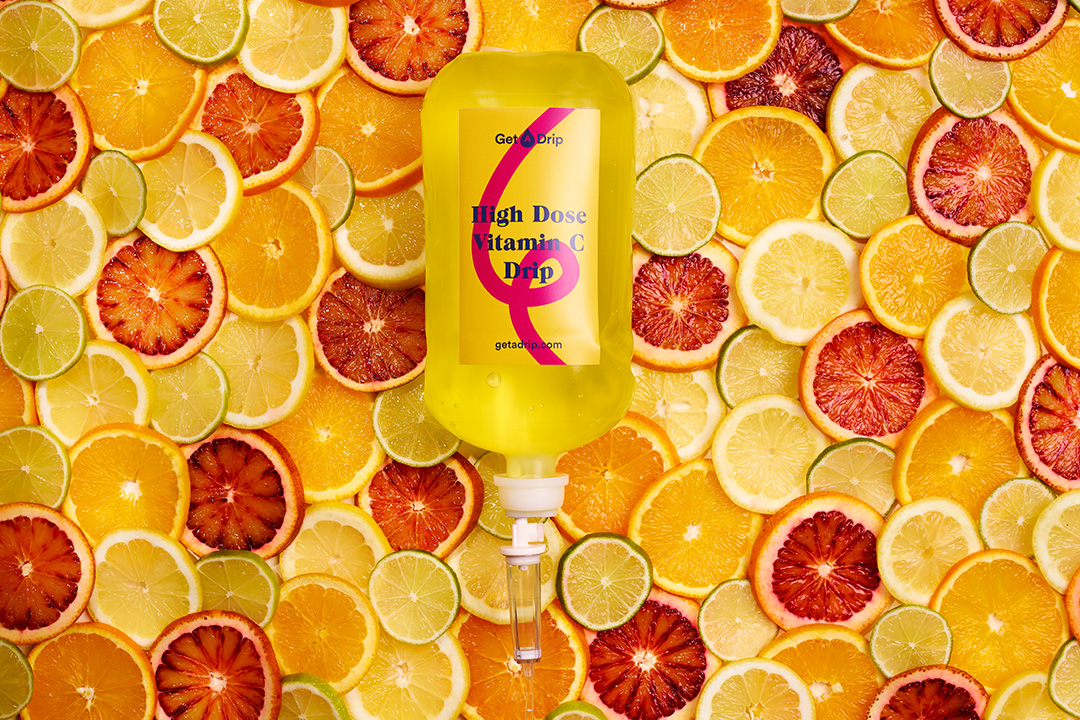From £125
High Dose Vitamin C
Choose from 6.25g up to 25g of High Dose Vitamin C for maximum antioxidant and anti-inflammatory effects, alongside major skin benefits.
Pricing:
- 6.25g Vitamin C – £125
- 12.5g Vitamin C – £150
- 25g Vitamin C – £225

Vitamin C (Ascorbic Acid)
Contributes to:
- Maintaining normal function of the immune system during and after intense physical exercise
- Normal collagen formation for the normal function of: blood vessels, bones, cartilage, gums, skin, and teeth.
- Normal energy-yielding metabolism
- Normal functioning of the nervous system
- Normal psychological function
- Normal function of the immune system
- Protection of cells from oxidative stress
- Reduction of tiredness and fatigue
- Regeneration of the reduced form of vitamin E
- Increased iron absorption
*Get A Drip reserve the right to change the ingredients, prices and products of all our services on a daily basis. Our products, ingredients and prices are subject to change at the discretion of Get A Drip up until payment for your Drip or Booster. All Vitamin Drips (IV) & Vitamin Injections (IM) require a free medical consultation prior to treatment.
Frequently Asked Questions
What does Vitamin C do?
Vitamin C has a range of functions, including support for your immune system and maintaining normal skin health. It is also a powerful antioxidant that can protect your cells from oxidative damage caused by free radicals, especially in times of stress or illness. Vitamin C also plays an important role in the production and absorption of other vital micronutrients too. It helps your body absorb iron, contributing to anaemia prevention, and is involved in regenerating the reduced form of Vitamin E – another micronutrient with antioxidant and anti-inflammatory properties. In addition, water-soluble Vitamin C contributes to the formation of collagen, a protein plays an vital role in building and supporting many tissues: from bones and cartilage to skin, hair, eyes, gums and blood vessels.
Signs that you may not be getting enough Vitamin C include: fatigue and weakness, dry skin and hair, irritability, slow wound healing, getting ill frequently, bruising easily, bleeding gums and anaemia.
What does Vitamin A do?
Vitamin A, otherwise known as retinol, has antioxidant properties similar to Vitamin C that helps protect cells against oxidative stress and damage caused by environmental toxins. It also serves several other important functions in your body, contributing to:
– Normal iron metabolism
– Maintenance of normal skin and mucous membranes
– Maintenance of normal vision
– Normal function of the immune system
– The process of cell specialisation/differentiation
Good dietary sources of Vitamin A include cheese, eggs, oily fish, liver, milk and yoghurt.
What is Vitamin C?
Vitamin C, otherwise known as ascorbic acid, is a water-soluble Vitamin that is found naturally in citrus and other fruits and vegetables, such as oranges, strawberries, and broccoli. Since our bodies cannot make or store Vitamin C, it is important that we obtain enough of it through our diets and by taking supplements. Not only is it an essential micronutrient, Vitamin C is also a powerful antioxidant that helps protect cells from oxidative stress caused by illness, inflammation, and environmental toxins such as pollution and ultraviolet (UV) light.
How do I support my immune system?
Your immune system is a complex network of cells, tissues, organs, and the substances they make that helps the body fight infections and other diseases. It is your body’s defence system against against viruses, bacteria, parasites and other pathogens that can cause you harm. Here are some ways to support your immune health:
– Eat a healthy and balanced diet to help prevent Vitamin deficiencies, which can negatively impact normal immune function. Many micronutrients contribute to your immune health, including Vitamin C, Selenium, Amino Acids, Zinc, Vitamin D, and B Vitamins: which is why it is important to eat a varied diet and take supplements if needed, in order to maintain optimal levels of these Vitamins and minerals.
– Take care of your gut health
– Avoid excessive alcohol consumption and smoke inhalation
– Practice good hygiene habits, such as proper hand washing
– Exercise regularly and maintain a healthy weight
– Get enough good quality sleep
– Minimise stress in your daily life
– Make sure to go to your GP for regular check-ups, and to seek their attention if you don’t feel like your usual self
Look after your immune system and it will look after you!
What is Curcumin?
Curcumin is a natural compound derived from turmeric plants. Like Vitamin C, Curcumin also has anti-inflammatory and antioxidant properties.